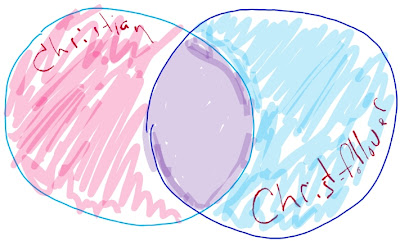No
true Christian would ever…
Let’s draw a Venn diagram, shall we?
Here we have two, very, very crudely drawn circles. One is labeled “Christian”, the other “Christ-follower.” Notice that the two are neither mutually exclusive nor are they equal. Meaning that one can be one, or the other, or both, or neither. But just because one falls under one label doesn’t mean she falls under the other one.
And now you may have one or two questions. I’ll see if I can figure them out and then answer them for you.
- What’s the difference between the first circle and the next?
- What does this all mean and what is your point?
- Couldn’t you have used the circle drawing tool in the SuperNote app? It would’ve looked so much better?
Well,
1) To say that one is a Christian is to say that one follows or is a member of a particular religion that is attached to not only the person and deification of Christ, but also the religious ties that have been drawn up since then. Rules, guidelines, prescriptions, seasonal celebrations (such as Lent coming up right now), worship, ascribed doctrine, regular (or irregular) gatherings with co-religionists, offerings and other sacrifices, etc. On the other hand, to say that one follows the Christ himself is to say that he or she follows the examples and teachings – as best as can – that Jesus set out during his ministry years.
2) This is done to point out the fallacy of the No True Scotsman rule as applied to public figures and their claims to Christianity. Men like Franklin Graham are going around affirming Gingrich and Santorum’s Christian credentials while plausibly denying Obama’s Christianity. As a retort, many on the left are declaring that Gingrich and Santorum cannot be true Christians. But to say that is to deny that Christianity is a religion fraught with horrible atrocities committed in the name of Christ. Christians supported religious wars against Muslims and other Christians, genocide against American Indians, Palestinians,
Though without Jesus’ approval and quite contrary to his teachings and examples.
3) Only two questions, please. So shut up.
So what we see here are two distinct but intermingled identities – one easy to identify (the particularly religious one) and one with different sets of criteria that can be seen through an engagement with the Gospels.
Please notice, unlike a particularly viral video posted by a young Christian, I don’t want to give off the impression that religion is bad. Christianity, for many Christ-followers, can give us an anchoring, an identity, a spiriual home, and a community that we may otherwise flail about without. Joining in the suffering of Jesus that is Lent helps to remind us and keep us focused as to the person, work and focus of Jesus. Prayer and meditation keep us connected to our source and heart and can energize us – or at least calm us down.
But one can – as we used to say – go through the motions without actually following Jesus.
Most self described Born Again Christians would agree with that statement. But I don’t mean the same thing they do, necessarily. Jesus said a tree is known by its fruits. We would have some overlap as to what those fruits look like (specifically, the fruits of the Spirit), but considering the de-emphasis on Jesus’ teachings on the sheep and the goats (the most obvious qualifications he gives), not much.
Let’s look at those qualifications:
- Love God.
- Love your enemies. (This means, particularly and without equivocation, we need to shun war and other acts of violence done against our neighbors and enemies.)
- Pray for those who persecute you.
- Let go of wealth. (This one is especially de-emphasized in modern times. We tend to say Jesus was okay with wealth, but the truth is he wasn’t. He considered it evil and he shunned it, personally. The creator god of the universe, for example, came to earth not just as a baby, but as a peasant. And then he lived homeless, as a vegabond. It’s within this context that we should understand his talk with the rich young ruler, or his lesson about the evil eye.)
- Work towards peace (Not just ending war, but all sorts of violence we do toward each other – including poverty)
- Visit those in prison (Rather than throw them in there to forget them under the auspice of “keeping us safer”.)
- Give water to the thirsty and feed the hungry (In other words, those arguing for an end to social programs for the hungry – without any real, tangible plans to alleviate the suffering of those who are dependent on them are in direct defiance of this order.)
- House the homeless (Ditto)
- Clothe the cold (Well, most of us seem to get that one right. For the most part. Seriously.)
- Love your neighbor as yourself.
Now, keep in mind, the parts in parentheses are interpretations of the more direct exhortations in the Gospels (and the epistles as well). They are not direct commands, but I tend to think they’re pretty obvious from the context of Jesus’ culture and socio-political surroundings, as well as from the way that Jesus and the first few centuries’ worth of his followers practiced out their faith. But again, my interpretation.
Which, I think, goes to show how complex it can be to try to point and say, “He’s in; she’s out; she, in…” I’m not so sure that’s our place. Because if we were to go by specific rules, then we “all fall short of the glory of God.” To follow Christ is to acknowledge that we are traveling, and that there is no destination, only journey.
I was highly tempted to list those I felt belonged in certain groups. But I think I’ll refrain from that pharisaism. If public figures want to go around and act like anti-Christs while they claim the name of Christian, then they make their own rotten fruits evident.








